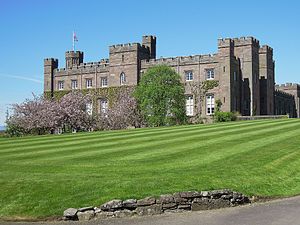
Scone Palace /ˈskuːn/ is a Category A-listed historic house near the village of Scone and the city of Perth, Scotland. Ancestral seat of Earls of Mansfield, built in red sandstone with a castellated roof, it is an example of the Gothic Revival style in Scotland.
Scone was originally the site of an early Christian church, and later an Augustinian priory. Scone Abbey was severely damaged in 1559 during the Scottish Reformation after a mob whipped up by the famous reformer, John Knox, came to Scone from Dundee. Having survived the Reformation, the Abbey in 1600 became a secular Lordship (and home) within the parish of Scone, Scotland. The Palace has thus been home to the Earls of Mansfield for over 400 years. During the early 19th century the Palace was enlarged by the architect William Atkinson. In 1802, David William Murray, 3rd Earl of Mansfield, commissioned Atkinson to extend the Palace, recasting the late 16th-century Palace of Scone. The 3rd Earl tasked Atkinson with updating the old Palace whilst maintaining characteristics of the medieval Gothic abbey buildings it was built upon, with the majority of work finished by 1807.
The Palace and its grounds, which include a collection of fir trees and a star-shaped maze, are open to the public.